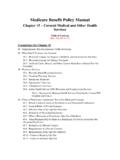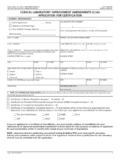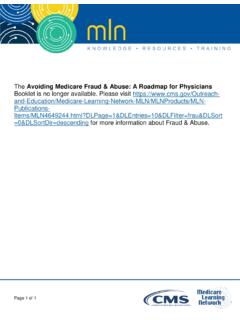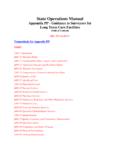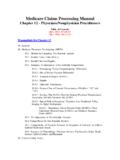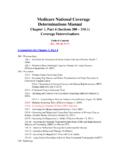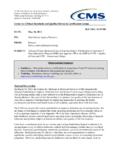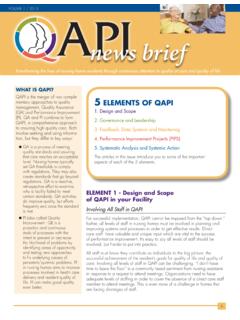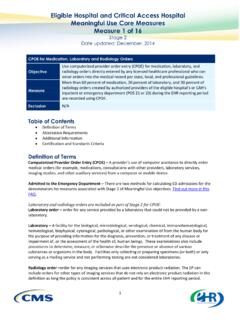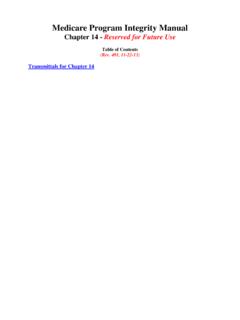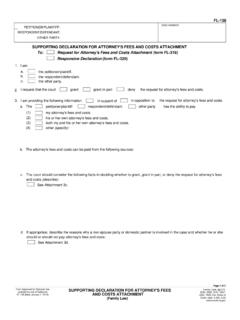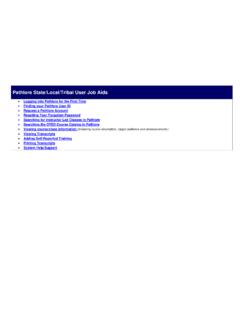Transcription of QSO-22-07 ALL Ambulatory Surgical Centers (ASC) Attachment
1 Ambulatory Surgical Centers (ASC) Attachment QSO-22-07 -ALL This Attachment is a supplement to and should be used in conjunction with QSO 22-07-ALL memorandum: Guidance for the Interim Final Rule Medicare and Medicaid Programs; Omnibus COVID-19 Health Care Staff Vaccination. The regulations and guidance described in this Attachment do not apply to the following states at this time: Alabama, Alaska, Arizona, Arkansas, Georgia, Idaho, Indiana, Iowa, Kansas, Kentucky, Louisiana, Mississippi, Missouri, Montana, Nebraska, New Hampshire, North Dakota, Ohio, Oklahoma, South Carolina, South Dakota, Texas, Utah, West Virginia and Wyoming. Surveyors in these states should not undertake any efforts to implement or enforce the regulation.
2 Q-0246 Condition for coverage Infection control. (c) Standard: COVID-19 vaccination of staff. The ASC must develop and implement policies and procedures to ensure that all staff are fully vaccinated for COVID-19. For purposes of this section, staff are considered fully vaccinated if it has been 2 weeks or more since they completed a primary vaccination series for COVID-19. The completion of a primary vaccination series for COVID-19 is defined here as the administration of a single-dose vaccine, or the administration of all required doses of a multi-dose vaccine. (1) Regardless of clinical responsibility or patient contact, the policies and procedures must apply to the following center staff, who provide any care, treatment, or other services for the center and/or its patients: (i) Center employees; (ii) Licensed practitioners; (iii) Students, trainees, and volunteers; and (iv) Individuals who provide care, treatment, or other services for the center and/or its patients, under contract or by other arrangement.
3 (2) The policies and procedures of this section do not apply to the following center staff: (i) Staff who exclusively provide telehealth or telemedicine services outside of the center setting and who do not have any direct contact with patients and other staff specified in paragraph (c)(1) of this section; and (ii) Staff who provide support services for the center that are performed exclusively outside of the center setting and who do not have any direct contact with patients and other staff specified in paragraph (c)(1) of this section. (3) The policies and procedures must include, at a minimum, the following components: (i) A process for ensuring all staff specified in paragraph (c)(1) of this section (except for those staff who have pending requests for, or who have been granted, exemptions to the vaccination requirements of this section, or those staff for whom COVID-19 vaccination must be temporarily delayed, as recommended by the CDC, due to clinical precautions and considerations) have received, at a minimum, a single-dose COVID-19 vaccine, or the first dose of the primary vaccination series for a multi-dose COVID-19 vaccine, prior to staff providing any care, treatment, or other services for the center and/or its patients.
4 (ii) A process for ensuring that all staff specified in paragraph (c)(1) of this section are fully vaccinated, except for those staff who have been granted exemptions to the vaccination requirements of this section, or those staff for whom COVID-19 vaccination must be temporarily delayed, as recommended by the CDC, due to clinical precautions and considerations; (iii) A process for ensuring the implementation of additional precautions, intended to mitigate the transmission and spread of COVID-19, for all staff who are not fully vaccinated for COVID-19; (iv) A process for tracking and securely documenting the COVID-19 vaccination status of all staff specified in paragraph (c)(1) of this section; (v) A process for tracking and securely documenting the COVID-19 vaccination status of any staff who have obtained any booster doses as recommended by the CDC; (vi) A process by which staff may request an exemption from the staff COVID-19 vaccination requirements based on an applicable Federal law; (vii) A process for tracking and securely documenting information provided by those staff who have requested, and for whom the center has granted, an exemption from the staff COVID-19 vaccination requirements.
5 (viii) A process for ensuring that all documentation, which confirms recognized clinical contraindications to COVID-19 vaccines and which supports staff requests for medical exemptions from vaccination, has been signed and dated by a licensed practitioner, who is not the individual requesting the exemption, and who is acting within their respective scope of practice as defined by, and in accordance with, all applicable State and local laws, and for further ensuring that such documentation contains: (A) All information specifying which of the authorized or licensed COVID-19 vaccines are clinically contraindicated for the staff member to receive and the recognized clinical reasons for the contraindications; and (B) A statement by the authenticating practitioner recommending that the staff member be exempted from the center s COVID-19 vaccination requirements based on the recognized clinical contraindications.
6 (ix) A process for ensuring the tracking and secure documentation of the vaccination status of staff for whom COVID-19 vaccination must be temporarily delayed, as recommended by the CDC, due to clinical precautions and considerations, including, but not limited to, individuals with acute illness secondary to COVID-19, and individuals who received monoclonal antibodies or convalescent plasma for COVID-19 treatment; and (x) Contingency plans for staff who are not fully vaccinated for COVID-19. GUIDANCE DEFINITIONS Booster, per CDC, refers to a dose of vaccine administered when the initial sufficient immune response to the primary vaccination series is likely to have waned over time.
7 Clinical contraindications refers to conditions or risks that precludes the administration of a treatment or intervention. With regard to recognized clinical contraindications to receiving a COVID-19 vaccine, facilities should refer to the CDC informational document, Summary Document for Interim Clinical Considerations for Use of COVID-19 Vaccines Currently Authorized in the United States, accessed at For COVID-19 vaccines, according to the CDC, a vaccine is clinically contraindicated if an individual has a severe allergic reaction ( , anaphylaxis) after a previous dose or to component of the COVID-19 vaccine or an immediate (within 4 hours of exposure) allergic reaction of any severity to a previous dose or known (diagnosed) allergy to a component of the vaccine.
8 Fully vaccinated refers to staff who are two weeks or more from completion of their primary vaccination series for COVID-19. Good Faith Effort refers to a provider that has taken aggressive steps toward achieving compliance with staff vaccination requirement and/or the provider has no or has limited access to vaccine, and has documented attempts to access to the vaccine. Primary Vaccination Series refers to staff who have received a single-dose vaccine or all required doses of a multi-dose vaccine for COVID-19. Staff refers to individuals who provide any care, treatment, or other services for the ASC and/or its patients, including employees; licensed practitioners; adult students, trainees, and volunteers; and individuals who provide care, treatment, or other services for the ASC and/or its patients, under contract or by other arrangement.
9 This also includes individuals under contract or by arrangement with the ASC, including hospice and dialysis staff, physical therapists, occupational therapists, mental health professionals, licensed practitioners, or adult students, trainees or volunteers. Staff would not include anyone who provides only telemedicine services or support services outside of the ASC and who does not have any direct contact with patients and other staff specified in paragraph (c)(1). Temporarily delayed vaccination refers to vaccination that must be temporarily postponed, as recommended by CDC, due to clinical precautions and considerations, including, but not limited to, individuals with acute illness secondary to COVID-19, or individuals who received monoclonal antibodies or convalescent plasma for COVID-19 treatment in the last 90 days.
10 ( ) Background All ASCs are required to achieve a 100% vaccination rate for their staff through the development of a policy to address vaccination applicable to all staff who provide any care, treatment, or other services for the ASC and/or its patients. There may be many infrequent services and tasks performed in or for a health care ASC that is conducted by one-off vendors, volunteers, and professionals. ASCs are not required to ensure the vaccination of individuals who very infrequently provide ad hoc non-healthcare services (such as annual elevator inspection), services that are performed exclusively off-site, and are not at or adjacent to any site of patient care (such as accounting services), but they may choose to extend COVID-19 vaccination requirements to them if feasible.
